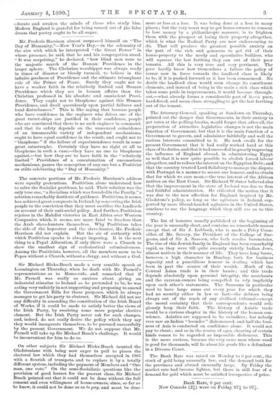Mr. Frederic Harrison almost surpassed himself on " The Day
of Humanity,"—New Year's Day,—in the solemnity of the airs with which he interpreted " the Great Power " in whose presence, he said, that he and his congregation stood. " It was surprising," he declared, " how blind men were to the majestic march of the Human Providence in the larger sphere. The Christian worshipper was always ready in times of disaster or bloody turmoil, to believe in the infinite goodness of Providence and the ultimate triumphant rule of the Prince of Peace. Surely they ought not to have a weaker faith in the relatively limited and Human Providence which they see in human affairs than the Christian professed in his absolute and omniscient Provi- dence. They ought not to blaspheme against this Human Providence, and dwell querulously upon partial failures and local disturbances." This is like saying that because people who have confidence in the engineer who drives one of the great turret-ships are justified in their confidence, people who are convinced that there is no such engineer in command, and that its safety depends on the unsecured coincidence of an innumerable variety of independent mechanisms, ought to have equal confidence in the result, and ought not to " blaspheme " if the failure of superintendence result in some great catastrophe. Certainly they have no right at all to blaspheme in such a case,—they have no one to blaspheme against,—but how they are to have faith in the " relatively limited " Providence of a concatenation of unconscious mechanisms, passes the conception of auy one but a Positivist on stilts celebrating the " Day of Humanity."














































 Previous page
Previous page